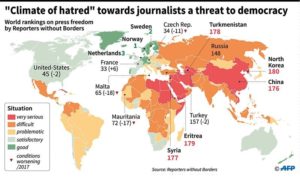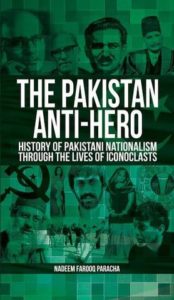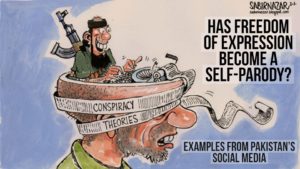 The abduction of newspaper columnist and prominent critic of the military, Gul Bukhari (left), came just a day after the army’s chief spokesman declared that social media users who rebuked the military were engaged in “anti-state activities” and were being monitored by the army’s spy agency. While Bukhari was subsequently released, the two events have further chilled the political environment in Pakistan’s already beleaguered democracy, the New York Times reports.
The abduction of newspaper columnist and prominent critic of the military, Gul Bukhari (left), came just a day after the army’s chief spokesman declared that social media users who rebuked the military were engaged in “anti-state activities” and were being monitored by the army’s spy agency. While Bukhari was subsequently released, the two events have further chilled the political environment in Pakistan’s already beleaguered democracy, the New York Times reports.
“There is a palpable climate of fear about what can be said about whom, how, and where — not just on mainstream media but also on social media,” said Adil Najam, the dean of Pardee School of Global Studies, Boston University. “This is not healthy for the state of democracy in general, but especially not right before an election.”

RSF
Pakistan has always been a difficult place for reporters, who often find themselves caught between militant Islamists and the country’s powerful intelligence services, the FT adds:
This year the country was ranked 139th out of 180 on the Press Freedom Index, compiled by Reporters Without Borders. But journalists say attacks have stepped up as the July 25 general election approaches and the army’s power struggle with the civilian authorities intensifies.
“It is very worrying when journalists get attacked and it creates a sense of fear,” said Daniel Bastard, head of RWB’s Asia-Pacific desk. “Those who do not toe the line of the military are under a clear threat and that has got much worse ahead of the general election.”
Some experts suggested that media could serve as a catalyst for fundamental reform.
“A growing and educated urban middle class and an ongoing information and communications revolution—which extends even to Pakistan’s rural areas—through electronic and social media should act as catalysts for this change,” analyst Ishrat Husain wrote in a recent Wilson Center report on Pakistan’s Institutions.
 The pre-poll process is ‘unfair,’ according to a survey by the Pakistan Institute of Legislative Development and Transparency (PILDAT) — an independent think tank.
The pre-poll process is ‘unfair,’ according to a survey by the Pakistan Institute of Legislative Development and Transparency (PILDAT) — an independent think tank.
 “The most alarming findings of PILDAT’s assessment are related to the media and the military,” writes Raza Rumi, a former Reagan-Fascell fellow at the National Endowment for Democracy:
“The most alarming findings of PILDAT’s assessment are related to the media and the military,” writes Raza Rumi, a former Reagan-Fascell fellow at the National Endowment for Democracy:
The perception of the latter’s neutrality towards competing political parties and candidates received the lowest score; that is, 33.4 percent. The perception of private media freedom from the influence of state institutions and vested interests was scored as 37.8 percent.
“There is no surprise when it comes to the military but the low score on the media front is worrying,” he adds.
 Once hailed as a dynamic expression of the people’s will, social media in Pakistan, and the rise of disinformation in particular, pose a threat to democracy in the country today. A look at the quality of discourse on social networking sites suggests that online, freedom of speech may well have become an unintentional self-parody.
Once hailed as a dynamic expression of the people’s will, social media in Pakistan, and the rise of disinformation in particular, pose a threat to democracy in the country today. A look at the quality of discourse on social networking sites suggests that online, freedom of speech may well have become an unintentional self-parody.
One of the most striking examples of this came in the wake of a 2013 article in the Dawn, a leading Pakistani daily newspaper, in which celebrated journalist Nadeem F. Paracha satirized the absurd allegation that girls’ education advocate Malala Yousafzai was a western agent. Seeking to advance an agenda of their own, certain Urdu newspapers, as well as Iran’s Press TV network, reported on the satire as legitimate news. By the time the Dawn had issued disclaimers setting the record straight, many thousands of social media users had shared the article as fact.
In a forthcoming presentation, Reagan-Fascell Fellow Nadeem F. Paracha will show how this case, like so many others, represents the impact that viral hoaxes, rumors, and other forms of manipulated information can have through social media.
Nadeem F. Paracha
 Reagan-Fascell Democracy Fellow
Reagan-Fascell Democracy Fellow
moderated by
Zerxes Spencer
Senior Manager, Fellowship Programs
National Endowment for Democracy
Tuesday, June 19 2018
3:00 p.m.–4:30 p.m.
1025 F Street, N.W., Suite 800, Washington, D.C. 20004
Telephone: 202-378-9675 RSVP
Mr. Nadeem F. Paracha, or “NFP” as he is known, is a prominent Pakistani journalist, cultural critic, and columnist currently associated with DAWN, Pakistan’s largest English-language daily. He is a widely read columnist who has commented on the rise of religious extremism and the importance of carrying forward Pakistan’s democratic experiment. In 2016, he published his first book, End of the Past, a social and cultural history of Pakistan, followed in 2017 by his second book, The Pakistan Anti-Hero. His third book, Points of Entry, was published internationally in June 2018. During his fellowship, Mr. Paracha is tracing the pluralistic and democratic roots of Muslim nationalism in Pakistan, a research project that will culminate in a book intended to serve as a counterpoint to the dominant extremist narrative in the country.







